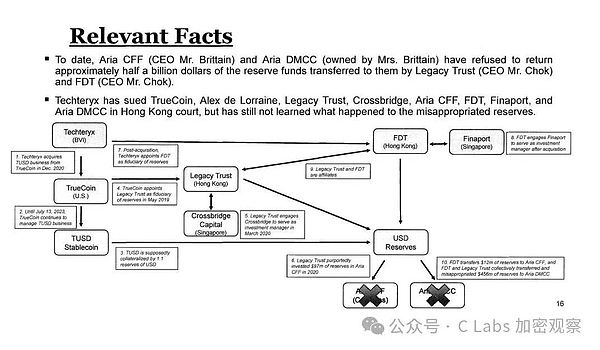
Author: C Labs Crypto Observation
The recent public rights protection of Brother Sun actually casts a shadow on the development of the crypto industry in Hong Kong. This matter is actually very simple:
FDT invests US$456 million in stable TUSD's reserves in high-risk and low-liquid assets, such as manufacturing plants and mines, rather than holding cash or treasury bonds as per stablecoin practice.
The exaggeration of this matter is that TUSD claims to have an audit, but this audit is of no use.
The audit report only verifies the account balance at a certain point in time, but does not check the flow of funds or the investment composition.
FDT invested $456 million in mines and manufacturing plants. This high-risk operation was not discovered, and the audit was obviously failing.
However, in Hong Kong, not only are there any tricks in the accounts of compliant institutions, but even the financial data of Hong Kong are worth in-depth discussion:
is the financial data of Hong Kong. This data can be downloaded directly from the website of the Hong Kong Financial Secretary. I put the link at the bottom "click on the original text" to view it.
Before explaining this set of data, I will first put a picture:
This is a fiscal forecast given by the Hong Kong Financial Secretary, indicating that Hong Kong's deficit is decreasing and will start to make a surplus in three years.
It looks like the trend is good?
But this picture also hides a little secret. In theory, Hong Kong's financial reports should follow the IMF's issuance of the "Finance Statistical Manual" (GFSM) and local accounting standards. Under these guidelines, the definitions of income and expenditure are clearly distinguished:
Revenue: mainly includingTaxes (such as profit tax, salary tax, stamp tax), land transfer fees, utility charges, investment income, etc. These are recurring or non-borrowing income.
Expenditure: Including recurring expenses (such as salary, benefits) and capital expenses (such as infrastructure projects).
Deficit: usually refers to the part where the total expenditure exceeds the total income, that is, the "comprehensive deficit".
Borrowing: such as issuing bonds (green bonds, infrastructure bonds, etc.), is regarded as financing activities, rather than "income" in the traditional sense.
In other words, the deficit = income-expenditure (including interest expenses), should have nothing to do with the loan
But the deficit announced by Hong Kong=income + loan-expenditure
If the loan is removed, the deficit in Hong Kong is like this:
If it is drawn into a curve chart, it is:
According to this trend, the main method for Hong Kong to turn the deficit positive may be to increase the amount of loans...
According to this trend, Hong Kong's main method to turn the deficit positive may be to increase the amount of loans...
Because according to the 25/26 fiscal year budget released by Hong Kong, the difference in revenue-expenditure is -162.9 billion Hong Kong dollars, while the budget announced deficit is only more than 60 billion.
The 100 billion in the middle is expected to rely on issuing bonds...
Hong Kong did not borrow much before the epidemic, and often repay some debts.
Because Hong Kong is different from the United States, the US debt is issued by the United States and can be repaid by printing the money.
left;">As a stablecoin in the US dollar, the Hong Kong dollar needs to be bound to the US dollar of 7.8:1 exchange ratio, so the money borrowed in Hong Kong cannot be repaid by printing money on its own.
As an encryption center, if Hong Kong does not clarify its own accounts and supervise others as a regulator, it will always feel a bit strange.











